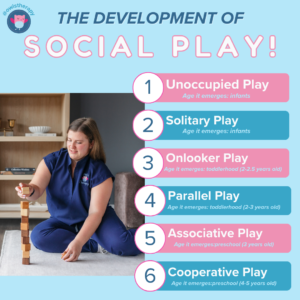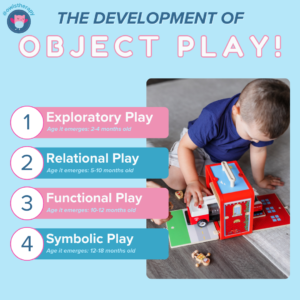Welcome back to The Importance of Play: Part 2! Be sure to check out The Importance of Play: Part 1, to learn the benefits of play and general signs of play difficulties. You can read more about it here!
Today’s post will cover social play stages (play with others), object play (play with objects) and ways you can help facilitate play skills at home. Now that we know the importance of play, let’s chat about milestones to watch for within the play stages as your child grows and develops!

Social Play Development
Social play involves play with other peers and caregivers. Social play includes sharing, back and forth play (i.e. turn taking), following rules, and using social cues for children to cooperate with each other.
- Unoccupied Play:
- Age it emerges: Infants
- Watching the world around them (people, objects), but not engaging with them.
- Example: Splashing their arms and legs in the water during their bath.
- Solitary Play:
- Age it emerges: Infants
- Playing alone with objects than nearby peers
- Example: Laying under their play gym and playing with the hanging toys.
- Onlooker Play
- Does not have a specific age of development. Begins under 1 years old; however, emerges in toddlerhood (2-2.5 years old).
- When a child watches others play, but does not join the play routine or does not know how to join. A child may ask questions in regards to what they are observing.
- Example: Watching children play on the playground.
- Parallel Play
- Age: Toddlerhood (2-3 years)
- Playing side by side with a peer, with each child focused on their own play.
- Example: Children playing side by side in the sandbox. One child may be filling up a bucket with sand, the other child digging a hole.
- Associative Play
- Age: Preschool (3 years of age)
- Children are interested in interacting with each other. Children may also play and share toys, but are not working or playing together for any shared purpose.
- Example: Children playing with blocks together but each doing different things. One child may be building a tower, while the other builds a house. While playing, the children are talking with each other.
- Cooperative Play
- Age: Preschool (4-5 years)
- Sharing ideas and toys, along with following established rules and guidelines during play. Cooperative play has a shared purpose as children begin to work together. This goes along with pretend play.
- Example: Children playing hide and seek together.

Object Play Development
- Exploratory Play
- Age: 2-4 months old
- Exploring single objects/toys through shaking and mouthing.
- Example: Banging a rattle.
- Relational Play
- Age: 5-10 months old
- Exploring how objects go together.
- Example: Stacking blocks.
- Functional Play
- Age: 10-12 months old
- Relating objects together.
- Example: Stirring with a spoon.
- Symbolic Play
- Age: 12-18 months old
- Using objects in a nonliteral way.
- Example: Feed, dress and send a baby doll to school on an imaginary school bus.
Looking for some ways to encourage play at home? Check out our tips below!
- Create a space in your home specifically for play. By making a dedicated space, your children can play freely and create endless different play scenarios without restrictions. Example: Your children may create a school. They can pretend to be a teacher and their dolls (legos, Barbies, stuffed animals, you name it!) can be the students. This play scheme may go on for days!
- Have open-ended toys available. Open-ended toys can be used multiple ways which can help foster creativity and imagination.
Example: some open-ended toys include blocks or play dough.
- Play with your child! Meet your child where they are in play. If your child is engaging in imaginative play, participate with them! Model language, create silly voices or characters, help expand their pretend play scenarios to prompt language and connect with them.
Play is critical for language, cognitive, physical, social and emotional development. These skills are not only important during early development, but are essential for a child’s academic success in the future. If you have any concerns about your child’s play development, please don’t hesitate to reach out to us!
Northern Virginia
Phone: 703-470-6957
Email: info@owlstherapy.com
Philadelphia’s Main Line
Phone: 610-579-0914
Email: philadelphia@owlstherapy.com
